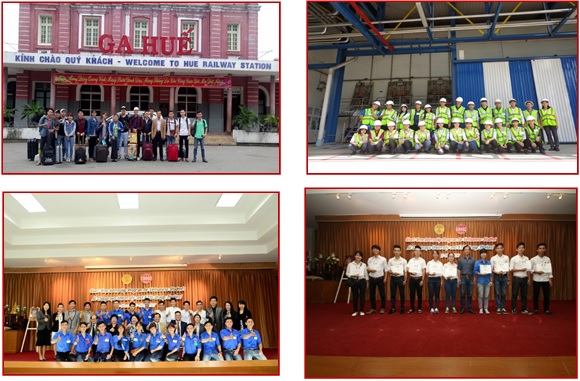1) Introduction
The Faculty of Chemical Technology - Environment was established on 28th December 2017, on the basis of the Faculty of Chemical Technology of the College of Technology, which was established in 2002.
There are 4 divisions: Food Technology, Biotechnology, Chemical Technology, Environmental Engineering, corresponding with 4 specialized trainings: Food Technology, Applied Biology, Material Technology, Environmental Technology.
The Faculty consists of 1 main office, 1 subject room, and 7 laboratories which are gradually equipped with facilities for training and researching
2) Staff
The Faculty of Chemical Technology - Environment has currently 27 employees (25 lecturers) including 14 Ph.Ds, 2 Ph.D. candidates, 9 masters, and 2 staffs. There are numerous faculty members have been trained and professionally practiced overseas, such as France, Germany, Australia, Japan, China, Thailand, Taiwan. We are young faculty as the young lecturers contribute 74% of total lecturers. The lecturers are always enthusiastic, trying their best to perform the assigned tasks.
3) Curriculum
The mission of the Faculty is to train technology bachelor and engineer (application-oriented) in 4 undergraduate programs: Food Technology, Applied Biology, Material Technology, Environmental Technology.
The training and scientific research in the Faculty is constantly growing in both quantity and quality. In each year, around 150 undergraduate students are enrolled in the Faculty. To upgrade the university level, we move to focus on doing research and enhancing professional qualifications. The annually enrolled students are shown in the following graph:
Training scale over the years
4) Research activities
Scientific research works are always on ahead apart from training students, make towards implementing technology transfer.
The Faculty has the potential for researches in:
- Environment, specific about Solid Waste Management, Wastewater Treatment, Biodiesel, Eco-technology;
- Food Science, specific about Biochemistry, Polymer Chemistry, Seaweed;
- Biotechnology;
- Basic Chemistry, Material Technology.
The numerous articles published in prestigious international journals (ISI) are increasing every year. ISI papers published from 2015 to 2020: Food Technology (18), Biotechnology (21), Chemical Technology (16), Environmental Technology (22). In addition, the number of research projects of students and lecturers tends to research applications and technology transfer to actual production and life.
The Faculty has constantly created the best conditions for students to access professional training programs; have the opportunity to accumulate practical experience through internships at companies, factories; strengthen cooperation with international universities.

Student internships
Performing international cooperation and exchanging student are regular yearly activities of the Faculty, yearly. Besides, we initially created teams, such as teacher research teams, student research teams, to strengthen cooperation, study together, support and develop research.
Some student products of 4 specialized trainings in the Faculty
OFFICE OF EXTERNAL RELATIONS AND OUTREACH
48 Cao Thang, Da Nang, Viet Nam
Follow us on Facebook: Khoa Công nghệ Hoá học - Môi Trường.